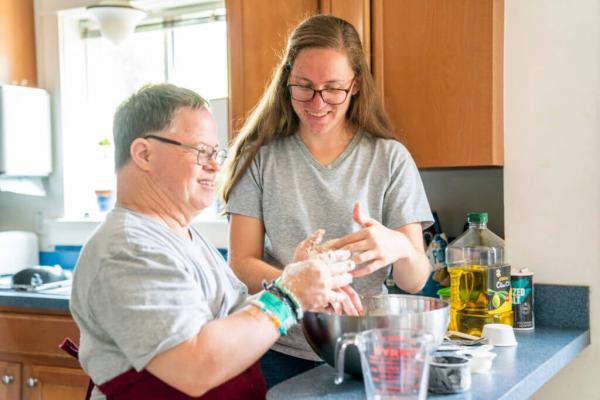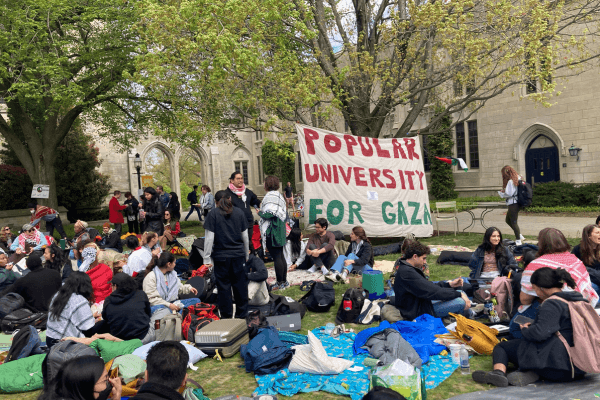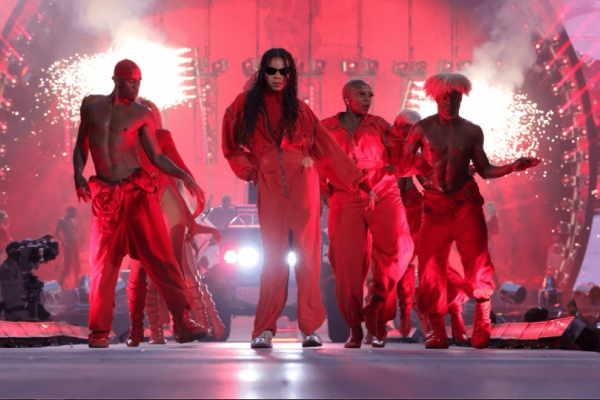Since 2020, I’ve been spending time at a L’Arche community in Washington, D.C., where people with intellectual disabilities and nondisabled people live together. I was at first a live-in assistant, and then I became a service team leader, providing direct care while also helping to lead the team of assistants.
In 2023, — less than a week after my community learned through a report on two years’ worth of research that our formerly-revered founder, Jean Vanier, was even more violent and horrifying than we thought — Fritz, a core member of my L’Arche community, and I flew across the country.
Fritz was attending a retreat just for L’Arche core members — anchors of L’Arche communities who live in and receive Medicaid-funded disability services in L’Arche homes — and I was accompanying him as his assistant and friend. Nestled just outside Seattle for a few nights, we enjoyed music, art, dance parties, nap time, and snacks. Friendship. Community. We all came from a home full of people like us, each of us representing a place where the joy of this gathering exists, multiplies infinitely.
We didn’t talk much about Vanier during the retreat.
I read through the consolidated, English-language report of Vanier’s abuse on the flight home to Washington, D.C.
Thinking about Vanier had not nauseated me in a while. But reading the report and staring at the magnitude of what he did caused me to feel a deep grief in my body. L'Arche was a place that was supposed to be safe, good, and beautiful. Vanier used that space to commit some of the most violating acts a human can inflict on another human.
I wish the world could read a thoroughly-researched, 900-page report from the women who Vanier preyed on; a full report, written in their own handwriting and spoken in their own voices about what he took from them. I wish the world could understand that the women are more than the sorrow brought about by this injustice. They are resilient, and whether we know them or not, their stories are a part of our story — the story of L’Arche as well as the broader human story.
While I never directly experienced Vanier’s abuse, his name is on the list of people who have harmed those who matter to me. I supervise a small team of mostly women, and almost every one of them has shared a story about a coworker, a partner, or a stranger harming them. When I think about those stories, I also think about the harm that Vanier caused. Those of us who have lived through these experiences bring that harm and what we’ve learned from it to our work because it impacts every part of our lives.
Before I heard the stories of my fellow caregivers, though, I moved into a L’Arche home. I was convinced enough by L’Arche’s story to sleep in a house with people I’d never met in the middle of a pandemic. I was in a vulnerable position, showing up in a city I’d never lived in with a suitcase, a houseplant, and a prayer. L’Arche could have broken my trust by not being the safe and beautiful place I imagined it to be. It didn’t.
Every day I get to hear my friends laugh and remain grateful that they put their trust in me.
What a gift their trust is. It is a trust that I’m not sure I’ve earned. Do they really have a choice about whether or not to have faith in me or the hundreds of other people who have been involved in our community? Do we live in a world safe enough for them to speak up if they were being harmed? At least 25 women in L’Arche’s community didn’t think so when Vanier harmed them. I hope that’s different now.
Our society is intentionally structured to make it unsafe for vulnerable people to speak up when they are experiencing violence like Vanier’s. And while the laughter I’ve shared at L’Arche certainly feels like it exists independently from the one person who used his power to harm people, as so many other charismatic leaders have done, if L’Arche has taught me anything it’s that nothing and no one can exist in isolation.
We are caught — or, better yet, held — in a vast web of interdependence, and we are lucky that is true because we need one another. Before coming to L’Arche, I put so much of my own worth in individualistic markers of success: a grade on a test, a comment from a professor, or my words being published somewhere. Then my job became simpler, more human: Tie some shoelaces. Make some breakfast. Take a walk with a friend around the block. I learned that the only validation I needed was the knowledge that something I did made it more possible for someone I love to live and thrive.
Once my friends in L’Arche dissolved in me the myth of independence, I was free. I found myself no longer constantly striving for affirmation; I no longer felt disappointment when external validation failed to make me feel better or more worthy of love. Interdependence set me free from any illusion that I could do good or be good all alone.
But at the same time, I began to understand the terrible truth of interdependence: Before we become solutions to our problems, we have to recognize our complicity in them. We exist in the same reality as all of the harm we have ever experienced, all of the harm we have ever perpetrated — whether we were active participants in that harm or passive ones.
I may have every intention of making the world a better place, but I’m still flying over a country that was stolen through domination and genocide, in a plane that is dumping carbon into the atmosphere, fueling climate change. I may not be the architect of a racialized capitalism that willingly sacrifices people in the global South for the sake of energy or labor, but I participate in systems that cause people direct harm. For example, I have the freedom to travel across the country while many of my siblings, people not unlike Fritz and other friends at L’Arche, are still isolated or killed by a pandemic that some have been able to ignore — due to age, ability, and access to comprehensive health care.
Many of these interconnected systems of oppression materially benefit me while also materially harming other people. But it has become crucial for me to understand that the same systems that benefit me actually harm me, too. They harm me because they harm someone connected to me. Once you start to grasp the sheer magnitude of interdependence, the injustice of the world can seem insurmountable.
In 1962, just a couple of years before Vanier would begin the community that became L’Arche, the writer James Baldwin wrote in The New York Times that “Not everything that is faced can be changed, but nothing can be changed until it is faced.” If we want to create a beloved community, then we have to understand that no single person enacts injustice and no single person can bring justice. We have to face our broken reality collectively in order to heal it. Even if that healing seems impossible.
I am still a part of L’Arche — an organization that was founded by a man who caused great harm — and I have to go about my work knowing that the injustice Vanier perpetrated happened alongside the goodness that L’Arche has brought into the world. The reason I continue to be committed to my community is that it puts me in the same room as so many people doing the hard work of making the world worthy of each of our previous lives.
I am reminded of how precious our lives are when I see the way Fritz’s face lights up upon meeting a new person, any person. A hand extended, a wide grin. “Hi-i-i-i” he laughs as he looks up, right into your eyes.
The flight attendant gives us one of each snack because Fritz is just that charming. I toss my granola bar onto Fritz’s tray table — I’m allergic to coconut. He tosses his almonds over to me and points, “You.” He pats my hand, just to let me know he’s there, and I doze off for a while on his shoulder.
We waddle back to the bathroom. Fritz is greeting every person in an aisle seat along the plane and people are smiling back at him, delighted to make a new friend. He rubs their shoulders and smiles because he is looking at a person and people are good.
People can be beautiful. People can be beautiful to each other.
People can also be ugly, violent, and cruel, and that is a part of our story, too.
But important, too, maybe more important, is the story of Fritz and our friendship. More important than Vanier’s abuse is the story of the survivors.
We get to write the next chapter of the story.
Got something to say about what you're reading? We value your feedback!







